Teacher’s name: Evgenia Chakarova
- Title of the game: “People’s labor and their profession”
- General aim of the game:
Through educational robotics, children form a concept about professions and the labor contribution of each person.
- Age range addressed: 5 -6 years old.
- Robot that can be used for this game:
The game is designed for the Clementoni MIND Designer educational robot. The MIND Designer robot can be programmed with the arrows in an easy and intuitive way.
Previous experiments have shown that this robot is very useful and facilitates the inclusion of students with special educational needs.
Description of the board :
A grid of 12 squares is made on the floor of the room, which is outlined by paper tape. Pictures of different professions are placed in the squares. Some of the squares are left empty – number 5, 7, 10.
Other useful materials
- Clementoni robot
- A drawn grid on the ground of 4/3 squares.
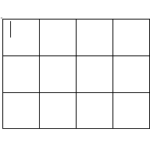
- Color pictures with professions.
- Colored small sheets with items needed for professions from No 3.
- Basket or box.
Phases of the game
- Preparation:
Days before the game, the kids in the group participate in Labor Day. Teachers and children clean the study room and the yard where they play every day. Through this activity, children realize that they need to appreciate every work done by people.
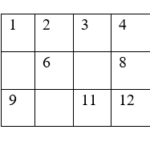
A grid of 12 squares is made on the floor of the room and is taped with paper tape. Pictures of different professions are placed in the squares. Some of the squares are left empty – number 5, 7, 10.
The pictures are arranged in the squares as follows:
Number 1 – fireman.
Number 2 – tailor.
Number 3 – waiter.
Number 4 – hairdresser.
Number 6 – artist.
Number 8 – photographer.
Number-9 – teacher.
Number 11 – ballerina.
Number 12 – doctor.
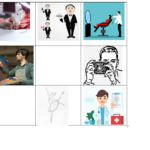
1.Star of the game:
The game board on the floor of the room is pre-prepared.
The children are divided into 2 teams on a free basis. One team has red smiley stickers and the other has yellow smiley stickers. The teams have a task: working with the robot in a network and researching the different professions /what they do, what knowledge is needed, what objects they work with, what is the benefit of their work/.
2.Core phase of the Game
Team Red Smiles and Team Yellow Smiles
Task:
A grid of 12 squares – 4/3 – is placed on the ground. Every single square has a picture of a given profession, with the exception of only three empty squares. The kids from the Red Smiles team line up around the net. The robot is placed in the starting position. A basket of leaves is placed on a table. On each sheet there is an object related to the professions in the network, for example: a paint brush, a camera, headphones, a fire extinguisher and others.
The children themselves decide who starts the game. The one who is the first to choose a card sees what is depicted without showing it to others. Through actions, facial expressions and gestures without speaking, he shows the others which profession the object he has drawn refers to. The rest of the children on the team must guess which profession the child imitated. When they guess, children from the team choose the shortest path to the corresponding occupation in the network. The child who starts the game releases the robot. So until all the children line up and explore the other professions. The robot is controlled by moving forward, backward, left, right. After the last child has finished the game, the “Yellow Smileys” team starts.
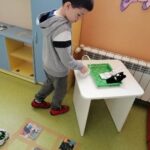
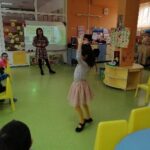
3.Conclusion:
Children realize that every profession is important for society and it is necessary to respect people with different professions. They understand that training, knowledge, skills are necessary for any profession and that they want to work in it. is the question that finds its answer is : “How should we contribute by ourselves and what is good to receive by others?”